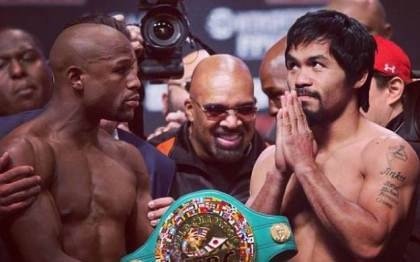In 1964 Walter Neale presented the Louis-Schmeling paradox. Named after two World War II-era heavyweight champions, the Louis-Schmeling paradox describes sports business as different from any other business when it comes to the potential benefit of a monopoly.
Generally speaking, monopoly is the ideal market position of any given business. Under a monopoly, competition is either comparatively weak or non-existent. This position allows the dominant business to absorb the lion’s share of potential customers. However, the same position is detrimental to a prize fighter. As the old adage “it takes two to tango” implies, Joe Louis could not sell out a big fight venue without formidable competition such as Max Schmeling.
With hindsight one can judge the competitiveness of yesterday’s bout with much greater ease and accuracy than tomorrow’s bout. However, fans and analysts alike rely on Las Vegas and online odds makers when determining the expected competitiveness of a future bout.
The lists below show Floyd Mayweather Jr.’s last ten bouts according to odds going into the bout and approximate PPV purchases. Although Mayweather was favored in each of the ten bouts, the first list has opponents numbered from most likely to least likely – according to these odds – to beat Floyd Mayweather in the days leading up to the fight:
Mayweather’s Odds by Opponent
1. De La Hoya -185
2. Alvarez -260
3. Hatton -270
4. Mosley -400
5. Marquez -425
6. Baldomir -510
7. Ortiz -600
8. Guerrero -650
9. Cotto -700
10. Maidana -1200
The second list reflects PPV sales from Floyd Mayweather’s last twen bouts from most to least successful:
PPV buys by opponent versus Mayweather
1. De La Hoya: 2,450,000
2. Alvarez: 2,200,000
3. Cotto: 1,500,000
4. Mosley: 1,350,000
5. Ortiz: 1,200,000
6. Marquez: 1,100,000
7. Hatton: 920,000
8. Maidana: 900,000
9. Guererro: 870,000
10. Baldomir: 325,000
Mayweather’s last ten bouts appear to largely fall in line with the theory discussed in the Louis-Schmeling paradox. Among all bouts that had over 900,000 PPV purchases, only two had odds in favor of Mayweather exceeding -500. Notably, Alvarez and De La Hoya top both lists, leading PPV purchases by a large margin. The closer Mayweather matches are predicted to be, the more people buy the PPV.
However, Manny Pacquiao’s last ten PPV matches tell an entirely different story.
Pacquiao Odds by Opponent
1. vs. Bradley II: -200
2. vs. Cotto: -215
3. vs. Marquez IV: -280
4. vs. Hatton: -295
5. vs. Bradley I: -450
6. vs. Margarito: -450
7. vs. Rios: -500
8. vs. Clottey: -600
9. vs. Marquez III: -900
10. vs. Mosley: -900
PPV buys by opponent versus Pacquiao
1. vs. Marquez III: 1,250,000
2. vs. Mosley: 1,200,000
3. vs. Cotto: 1,200,000
4. vs. Margarito: 1,150,000
5. vs. Marquez IV: 980,000
6. vs. Bradley I: 890,000
7. vs. Hatton: 800,000
8. vs. Bradley II: 775,000
9. vs. Clottey: 700,000
10. vs. Rios: 475,000
Pacquiao matches have odds and PPV numbers that do not appear to follow Neale’s theory. Specifically, Pacquiao’s top two selling matches were anticipated to be the least competitive. Moreover, his match with the highest publically perceived level of competition per casino odds (Bradley II -200) was the third lowest in PPV sales among his last ten bouts.
Consumers appear to be willing to buy PPV matches in larger numbers where either a) Floyd Mayweather Jr. is more likely to lose or b) Manny Pacquiao is more likely to win.
The rule that good competition influences sales appears to hold, but whether stiff competition is beneficial or detrimental to the athlete appears to depend on which athlete is the subject of the discussion. Apparently a formidable foe is paradoxically beneficial to Mayweather as his PPV sales appear to benefit from any probability of him losing. Quite the opposite appears in the case of Manny Pacquiao.
This contrast could be indicative of the degree to which personalities are factored into the competitiveness-versus-sales equation. Mayweather publically represents personality characteristics that repulse large numbers of people. He flashes money, brags about possessions, and declares his own greatness in terms that often exceed confidence and instead reflect all-out arrogance.
Floyd Mayweather is an American Olympic medalist and an undefeated professional. Further, he is drug and alcohol free and loyal to the long-standing members of his camp. Nonetheless, public distaste for his personality, not just the public’s desire for competition, appears to drive ticket sales for matches that he is more likely to lose higher than in other matches wherein he is more likely to win.
Unlike Mayweather’s undefeated record, Manny Pacquiao’s record includes five professional losses. Additionally, Pacquiao never accrued near the achievements as Floyd Mayweather Jr. in the amateur ranks. Moreover, allegations of tax woes and substance abuse have followed Pacman for years. Nonetheless, his personality seems to drive fans more than his deeds.
Manny Pacquiao presents the public with personality characteristics that draw their adoration. Pacquiao has a public perception of being a remarkably humble family man who is respectful toward everyone. This public persona puts him in the unique position of a prize fighter who can benefit from a less competitive fight.
It is remarkable what a difference one’s personality can make.
Bill Barner is a former certified “USA Boxing” Judge, Referee, and Trainer. He is a former sparring partner for several amateur and professional fighters and currently practices criminal and immigration law in South Florida for BarnerRossen PA. He has appeared in The Ring Magazine, Bleacher Report, VOICE Magazine, Youngstown Vindicator, USABF, and is a regular contributor to East Side Boxing. He can be reached at barner@barnerrossen.com or on twitter @BarnerBill.
